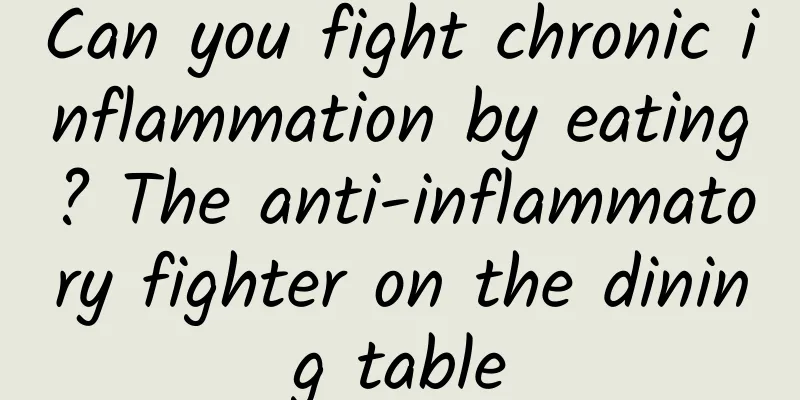Can you fight chronic inflammation by eating? The anti-inflammatory fighter on the dining table

|
Audit expert: Peng Guoqiu Deputy Chief Physician, Fourth Medical Center, PLA General Hospital In this fast-paced, high-stress era, chronic inflammation seems to have become an "invisible killer" for many people. It quietly erodes our bodies and causes various health problems. So, in addition to taking medicine and seeing a doctor, can we also fight chronic inflammation through our daily diet ? The answer is yes! Today, let us explore the anti-inflammatory warriors hidden on the dining table and see how they protect our health. 1 What is chronic inflammation? Source: Tencent First of all, we need to understand what chronic inflammation is? Chronic inflammation refers to inflammation caused by the persistent presence of inflammatory factors and tissue damage . Source | Science Popularization China This seemingly profound and somewhat unfamiliar term is actually quietly affecting the health of many people. Unlike acute inflammation, which causes redness, swelling, heat, pain, and aggressive attacks, chronic inflammation is often silent and difficult to detect, but it continues to erode our bodies in secret. It is like an "invisible killer" that lurks for a long time, causing chronic damage to various organs of the body, and may even increase the risk of heart disease, diabetes, arthritis and other diseases . 2 Where does chronic inflammation come from? Source: Science Popularization China In fact, its sources are varied and closely related to our daily lives. Bad living habits, such as staying up late for a long time, irregular diet, lack of exercise, etc. , may lead to the disorder of the internal environment of the body, and then cause chronic inflammation. In addition, environmental pollution, excessive work pressure, emotional instability, etc. are also common causes of chronic inflammation. When faced with chronic inflammation, the "invisible killer", we are not helpless. In addition to improving lifestyle habits and reducing stress, you can also fight chronic inflammation by adjusting your diet. We have to eat every day, and as a source of energy for humans, food has a strong anti-inflammatory ability. 3 Eat Healthy: Anti-Inflammatory Fighters in Food So, which foods have anti-inflammatory properties? Source: Baidu The first one is foods rich in omega-3 fatty acids . This type of fatty acid cannot be synthesized by the human body and must be ingested through food. They can inhibit inflammatory responses and reduce the production of inflammatory mediators. Deep-sea fish, flax seeds, walnuts, etc. are all foods rich in omega-3 fatty acids. Eating deep-sea fish a few times a week, or adding some flax seeds and walnuts to your daily diet, you can easily take in enough omega-3 fatty acids and build an anti-inflammatory defense line for your body. In addition to omega-3 fatty acids, foods rich in vitamin C are also good helpers in fighting inflammation. Source: Health Times Vitamin C has an antioxidant effect , which can remove free radicals in the body, reduce oxidative stress, and thus inhibit the occurrence of inflammation. Citrus fruits, strawberries, red peppers, etc. are all foods rich in vitamin C. Eating these foods in moderation every day can not only meet the body's needs for vitamin C, but also enjoy a rich and diverse taste and texture. Source | Baidu In addition, spicy foods such as ginger, garlic, and chili peppers are also natural anti-inflammatory agents. They are rich in active ingredients that can inhibit the production of inflammatory mediators and reduce inflammatory responses. Adding appropriate amounts of ginger, garlic, and chili peppers when cooking can not only enhance the flavor of the dishes, but also help the body fight inflammation. If you are not used to spicy tastes, you can add them gradually to each meal to allow your body to gradually adapt. Of course, in addition to choosing foods with anti-inflammatory effects, we also need to be careful to avoid foods that may aggravate inflammation , such as foods high in sugar, fat, and salt, as well as processed foods containing additives and preservatives . These foods may stimulate inflammatory responses and increase the burden on the body. Therefore, in our daily diet, we should try to keep it light and balanced, and consume more fresh and natural foods. Finally, it should be emphasized that although food has a certain anti-inflammatory effect, it cannot completely replace drug treatment. If the body has persistent inflammation symptoms, or the inflammation has caused obvious damage to the body, it is necessary to seek medical attention in time and seek professional treatment advice . A healthy diet can build a barrier for the body. If we learn to match them "smartly", we can prevent and control inflammation through diet. As for those foods that may cause inflammation, we should decisively say "no" and let health always stand on our side! |
Recommend
A universal method to improve operations and marketing conversion rates!
Previously, I shared that my favorite growth is r...
The two newly confirmed cases in the country were both imported from abroad, so we still need to be cautious about the epidemic!
From 0:00 to 24:00 on May 5, 31 provinces (autono...
The fifth one belongs to China, it will depart in 2025, with the goal of shocking the sky!
For a long time, the Earth had only one natural s...
The 6 underlying logics of brands behind Douyin’s full-case launch!
In recent years, new brands have risen rapidly, n...
A Complete List of English Terms for Advertising
When using professional tools, we can always retu...
The secrets of Xigua Video’s recommendation mechanism revealed!
To understand the recommendation mechanism, we mu...
China's first satellite was successfully launched!
On the evening of February 23, the Long March 3B ...
A Beginner's Guide to Brand Building
Brand building is a very difficult, lengthy and a...
Analysis of advertising strategies in the education franchise industry
The unexpected outbreak of the epidemic has broug...
Say goodbye to information asymmetry and restore the true truth about mobile phone repairs!
Some time ago, Ms. Wang from Wuhan repaired her m...
Electric Technology Car News: Jaguar E-Pace lowers its profile to create the cheapest coupe SUV. Can it escape the fate of being sold at a discount?
Despite its luxury brand positioning, Jaguar has ...
91 Ten Articles: China's car exports to Australia soared, Skyworth said it would invest another 30 billion to build cars
1. Changan Automobile plans to increase its layou...
Tesla showcases 4680 battery without tabs: cost reduced by 86%, density increased by 5 times
As competition in the new energy vehicle industry...
5 core strategies for brand promotion at Station B
Nowadays, Bilibili has become one of the most pop...
A "new" fish was discovered in the Yangtze River? Good news for the "old" fish as well →
We have discovered a new Yangtze River elf! Accor...









